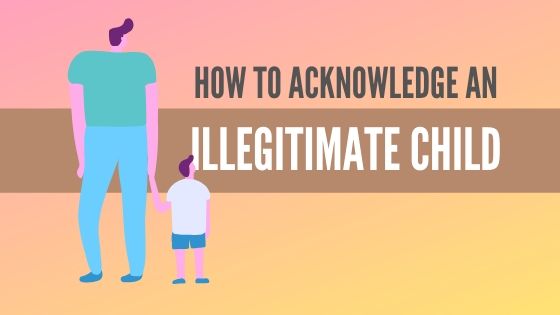How To Acknowledge an Illegitimate Child in the Philippines

As the father of an illegitimate child, you have the power to change both of your destinies by simply acknowledging (or not acknowledging) that the child is your own.
This article will teach you how to wield this power by discussing the legal procedures involved in acknowledging an illegitimate child in the Philippines.
Go back to the main article: An Ultimate Guide to an Illegitimate Child’s Rights, Birth Registration, and Legitimization
DISCLAIMER: This article has been written for general informational purposes only and is not legal advice or a substitute for legal counsel. You should contact your attorney to obtain advice with respect to any particular issue or problem. The use of the information contained herein does not create an attorney-client relationship between the author and the user/reader.
How Is an Illegitimate Child Acknowledged by the Father?
Filiation of an illegitimate child may be established in the same way and on the same evidence as legitimate children (Art. 175, Family Code), that is, by the record of birth appearing in the civil registrar or a final judgment; an admission of filiation in a public document or private handwritten instrument and signed by the parent concerned.
Absent these documents, filiation may also be established by the child’s open and continuous possession of such status or any other means allowed by the Rules of Court and special laws.
Specifically, a father may acknowledge his illegitimate child by executing and submitting any one of the following:
- Signing the Affidavit of Admission of Paternity (AAP) at the back of the child’s Certificate of Live Birth (COLB) in case the child is born in the Philippines and the Report of Birth (ROB) in case the child is born outside of the Philippines
- Executing a separate public document such as Affidavit of Admission of Paternity (AAP) or Affidavit of Acknowledgment. As provided for under Memorandum Circular 04-12 of the Office of the Civil Registrar General, other examples of public documents are those listed under Sec 19, Rule 132 of the Rules of Court and Supreme Court Rulings on the matter
- Executing a Private Handwritten Instrument (PHI), a document in the handwriting of the father duly signed by him where he expressly recognizes the paternity of the child during his lifetime
Please note that acknowledgment of the father of his illegitimate child will not automatically entitle the child to use the surname of the father. A document called Affidavit to Use the Surname of the Father (AUSF) has to be executed.
Related: How to Get Birth Certificate for a Newborn: An Ultimate Guide for Filipinos
What Is an Affidavit To Use the Surname of the Father (AUSF) and Who Will Execute the Document?
AUSF is a document allowing an illegitimate child to use the surname of the father. It shall be executed by the following:
- BY THE MOTHER (or guardian in the absence of mother) if the child is 6 years old and below
- BY THE CHILD HIMSELF if he is 7 years old to 17 years old, with the attestation of the mother (or guardian in the absence of the mother)
- BY THE PERSON HIMSELF without the need of attestation if he is 18 years old and above
Written by Atty. Kareen Lucero
in Family and Relationship, Government Services, Juander How, Legal Matters, NSO/PSA
Atty. Kareen Lucero
Kareen Lucero is a lawyer previously doing litigation before working for different agencies in the government and for a multinational corporation. She has traveled to 52+ countries including a 3-month solo backpacking in South East Asia and more than 1 year of solo traveling across four continents in the world. As part of giving back, she is passionate about sharing her knowledge of law and travel. She is currently doing consulting work for a government agency. For inquiries, you may reach her via Facebook Messenger (https://m.me/kareen.lucero.77) or email ([email protected]).
Copyright Notice
All materials contained on this site are protected by the Republic of the Philippines copyright law and may not be reproduced, distributed, transmitted, displayed, published, or broadcast without the prior written permission of filipiknow.net or in the case of third party materials, the owner of that content. You may not alter or remove any trademark, copyright, or other notice from copies of the content. Be warned that we have already reported and helped terminate several websites and YouTube channels for blatantly stealing our content. If you wish to use filipiknow.net content for commercial purposes, such as for content syndication, etc., please contact us at legal(at)filipiknow(dot)net